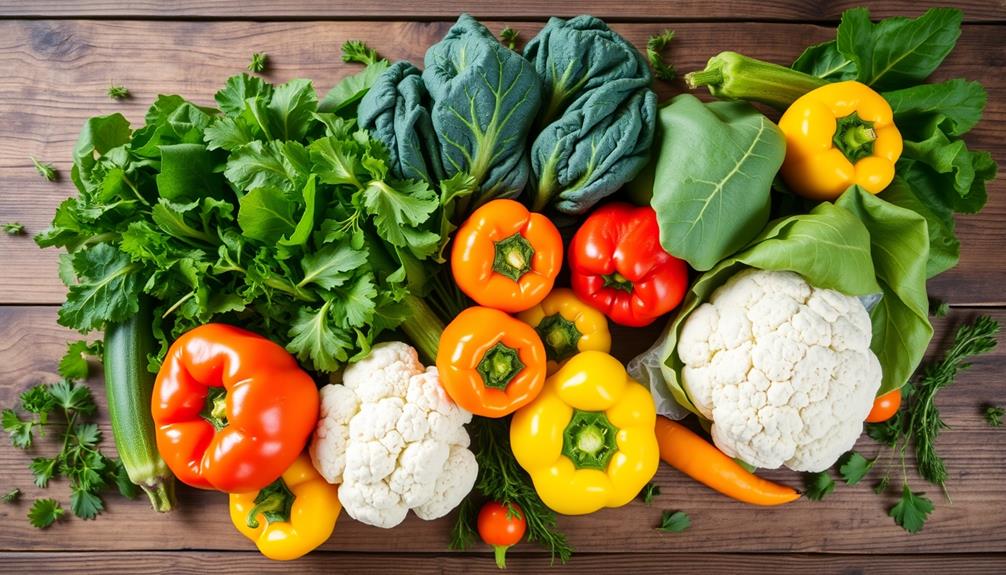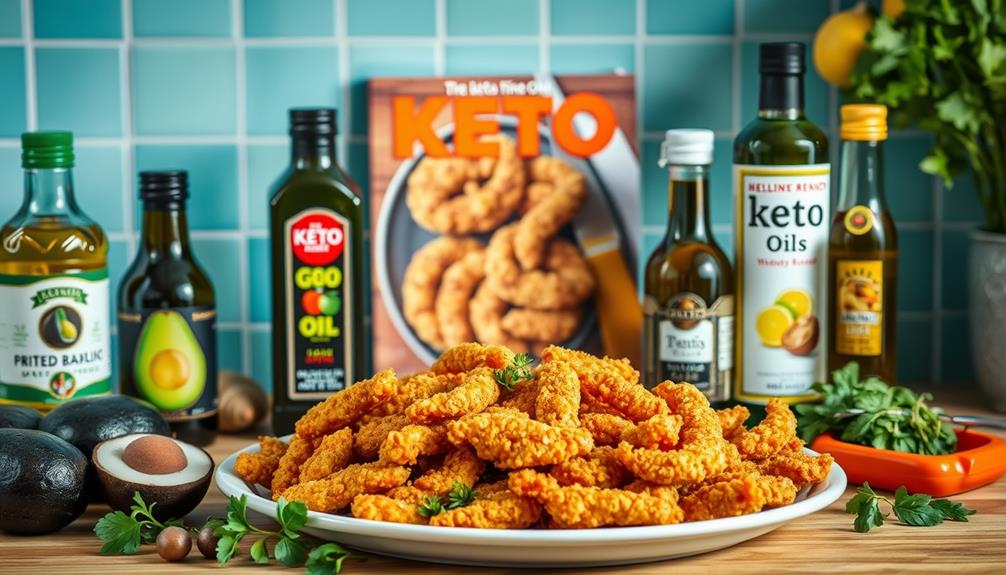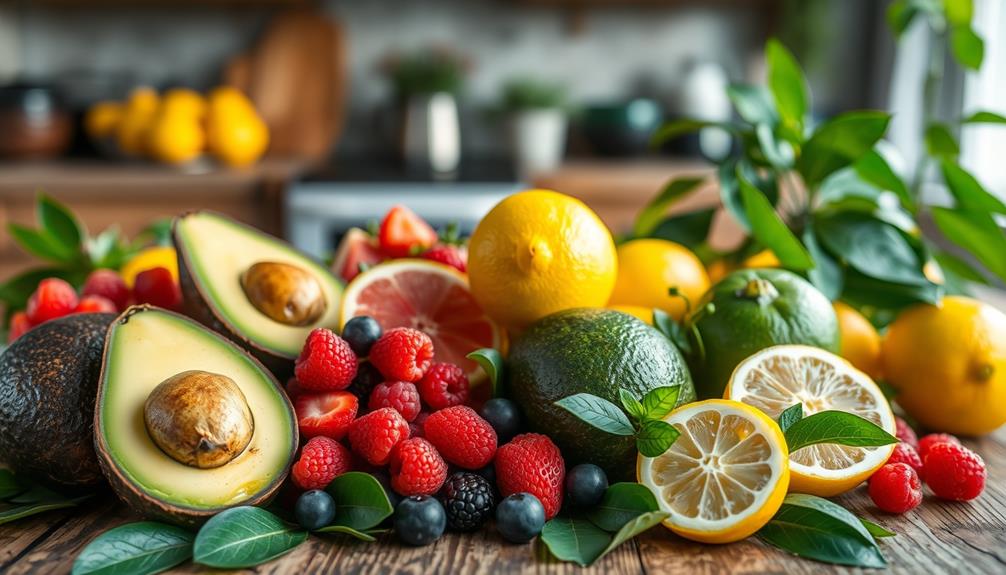When choosing vegetables for a keto diet, focus on non-starchy options. Leafy greens like spinach, kale, and arugula pack essential nutrients with less than 4 grams of carbs per serving. Cruciferous vegetables like broccoli and cauliflower are also great, containing about 4 to 8 grams of carbs per cup. Don't forget about zucchini and mushrooms, which offer even fewer carbs. Steer clear of starchy vegetables like potatoes, corn, and peas, as they can disrupt ketosis. By incorporating these keto-friendly veggies, you'll support your health and stay on track. There's more to discover about prepping these vegetables, too! To make the most of your keto diet, consider experimenting with different ways to enjoy these non-starchy vegetables. For example, you could try roasting cauliflower with a sprinkle of parmesan for a delicious side dish. Or, mix leafy greens with avocado, cherry tomatoes, and grilled chicken for a satisfying salad. There are countless ketofriendly salad recipes that incorporate these veggies in creative and tasty ways. Don’t be afraid to get creative in the kitchen and discover new ways to enjoy your favorite keto-friendly vegetables.
Key Takeaways
- Leafy greens like spinach and kale contain 1-4 grams of carbs per serving, making them excellent low-carb options.
- Cruciferous vegetables such as broccoli and cauliflower are nutritious, with 4-8 grams of carbs per cup, ideal for keto diets.
- Non-starchy vegetables like zucchini and mushrooms provide 2-3 grams of carbs per 100 grams and add flavor to meals.
- Avoid starchy vegetables like potatoes and corn, which contain over 15 grams of carbs and can disrupt ketosis.
- Incorporate a variety of low-carb vegetables to enhance nutrient intake and support overall health on a keto diet.
Overview of Keto Vegetables
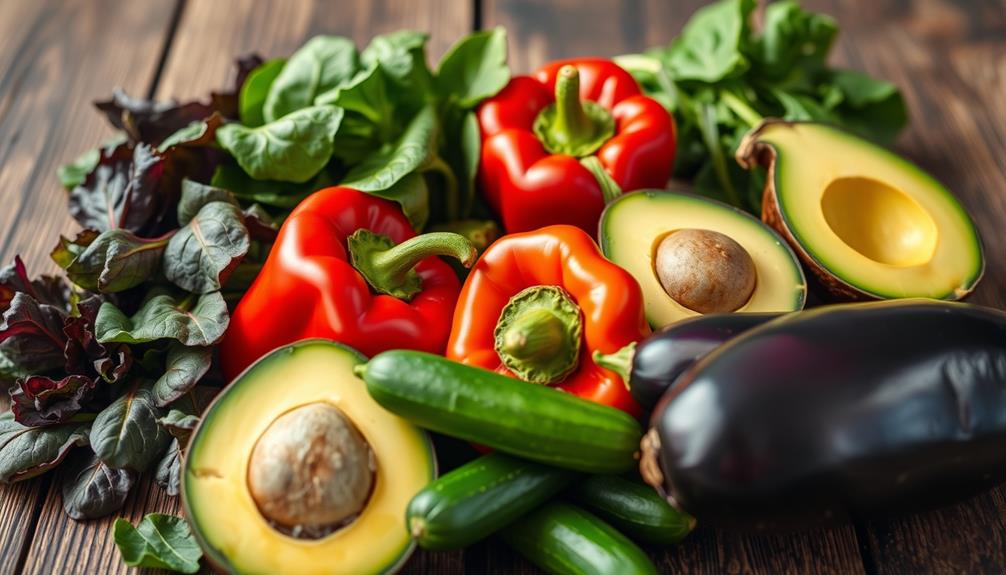
When it comes to choosing vegetables on a keto diet, what should you prioritize? You'll want to focus on non-starchy vegetables that are low in carb content and high in nutrients.
Leafy green vegetables, like spinach and kale, are fantastic options, boasting less than 1 gram of carbohydrates per cup while providing essential vitamins A, C, and K. These nutrients support overall health and weight loss efforts, while the high fiber content in these greens may also aid in digestive health, similar to the benefits of celery juice.
Cruciferous vegetables, such as broccoli and cauliflower, should also be on your plate. They typically contain 4 to 8 grams of carbohydrates per cup and are rich in fiber and antioxidants, which promote digestive health.
By incorporating these veggies into your meals, you'll reap numerous health benefits without risking your ketosis.
On the flip side, steer clear of starchy vegetables like potatoes and corn, as they can contain upwards of 15 grams of carbohydrates per serving, jeopardizing your low carb diet.
Top Keto-Friendly Options
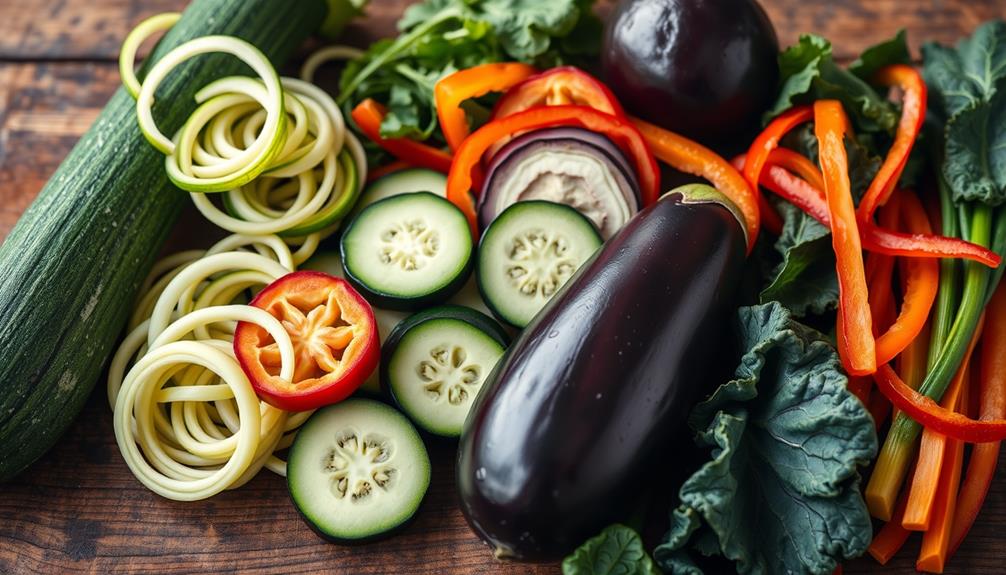
If you're looking to fill your plate with keto-friendly options, focus on a variety of nutrient-rich vegetables that keep your carb intake in check. Leafy greens like spinach, kale, and arugula are top choices, offering less than 1-4 grams of carbs per serving while providing essential vitamins A and K and being low in calories.
Incorporating these vegetables can also enhance your overall health, as they're packed with antioxidants and support immune function, which is vital during cold seasons when you might need cold medications overview.
Cruciferous vegetables, such as broccoli and cauliflower, are also fantastic options. Broccoli contains about 8 grams of carbs per medium stalk, while cauliflower has only 4 grams per cup, making them great low-carb substitutes.
Don't forget non-starchy vegetables like zucchini, which has approximately 3 grams of carbs per 100 grams and can be transformed into delicious zoodles.
Mushrooms are another excellent addition, with just 2-3 grams of carbohydrates per 100 grams, providing a nutrient-dense option that adds umami flavor to your meals.
Vegetables to Avoid
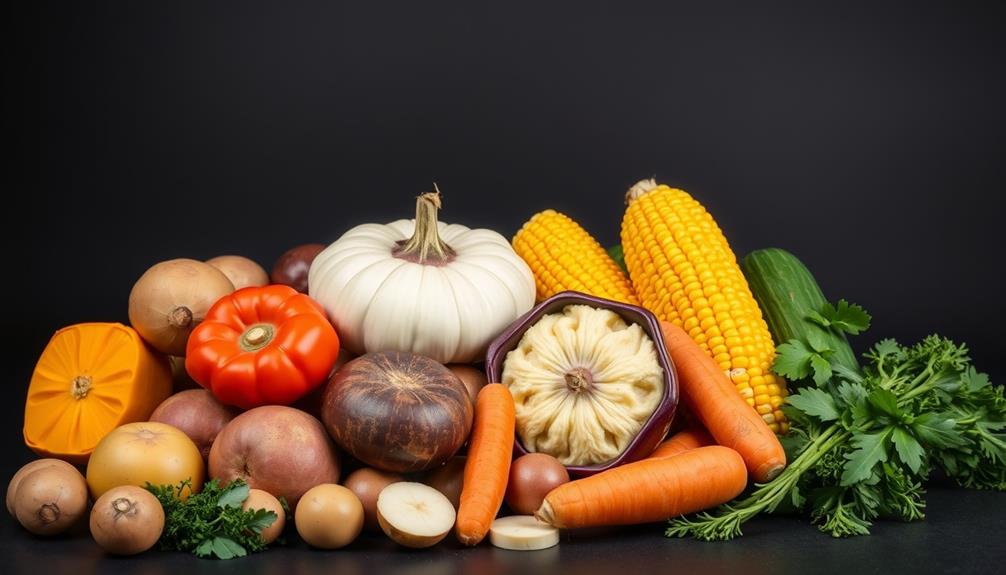
While you may be enthusiastic to explore a variety of vegetables on your keto journey, there are certain options you should steer clear of to maintain your carb limits.
Some vegetables to avoid are those that are high in carbohydrates and can disrupt ketosis. For instance, understanding effective strategies for weight loss can help you make informed decisions about your diet.
Potatoes are notorious for their high carbohydrate content, packing about 33.4 grams of carbs per medium potato. Similarly, sweet corn contains around 23.5 grams of carbohydrates per medium ear, making it unsuitable for a keto diet. Sweet potatoes aren't a better choice either, with approximately 16.82 grams of carbs per 100 grams.
You should also watch out for starchy vegetables like green peas, which have around 20.9 grams of carbohydrates per cup.
Carrots can sneak in extra carbs too, with about 9.08 grams of carbohydrates per 100 grams. These numbers may seem low, but they can quickly add up and hinder your goal of staying low in carbs.
Nutritional Benefits of Vegetables
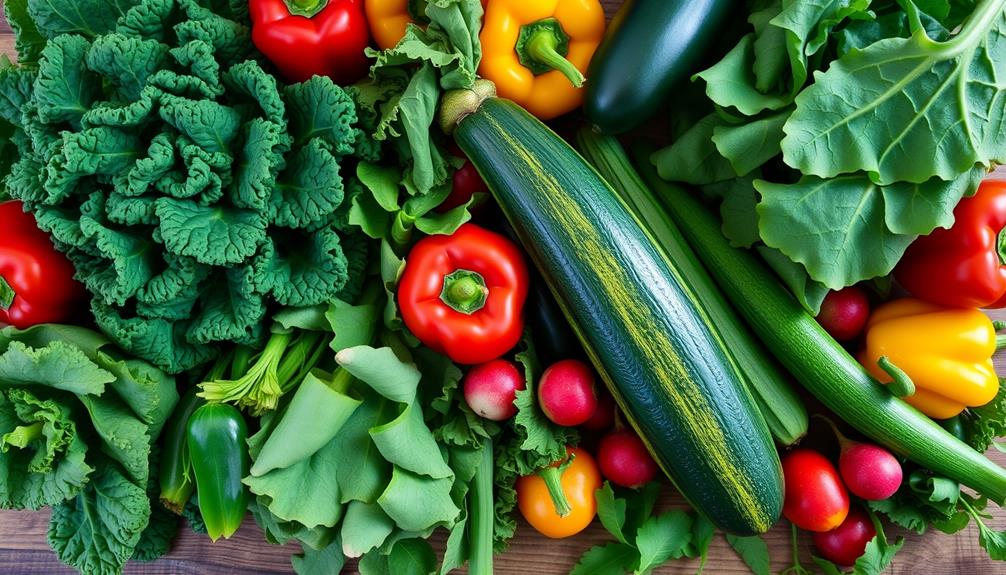
Avoiding high-carb vegetables is a smart move on a keto diet, but it's equally important to focus on the nutritional benefits of those you can enjoy. Low-carb vegetables aren't only low in calories but also high in fiber, which aids digestion and keeps you feeling full. This makes them perfect for weight management while following keto guidelines.
Additionally, incorporating certain essential oils, such as lavender oil, can enhance your overall wellness and support a balanced diet.
Many keto-friendly options, like spinach and kale, are packed with important vitamins A, C, and K that support your overall health and immune function. Cruciferous vegetables such as broccoli and Brussels sprouts are rich in antioxidants, helping combat oxidative stress and potentially reducing the risk of chronic diseases.
Additionally, non-starchy vegetables provide significant minerals like potassium and calcium, contributing to proper bodily functions and maintaining bone health.
By including a variety of low-carb vegetables in your meals, you enhance dietary diversity, ensuring you get a wide range of nutrients that support your metabolic health.
Incorporating these vegetables into your diet isn't just beneficial; it's essential for promoting long-term health while staying true to your keto lifestyle.
Cooking Methods for Keto Vegetables
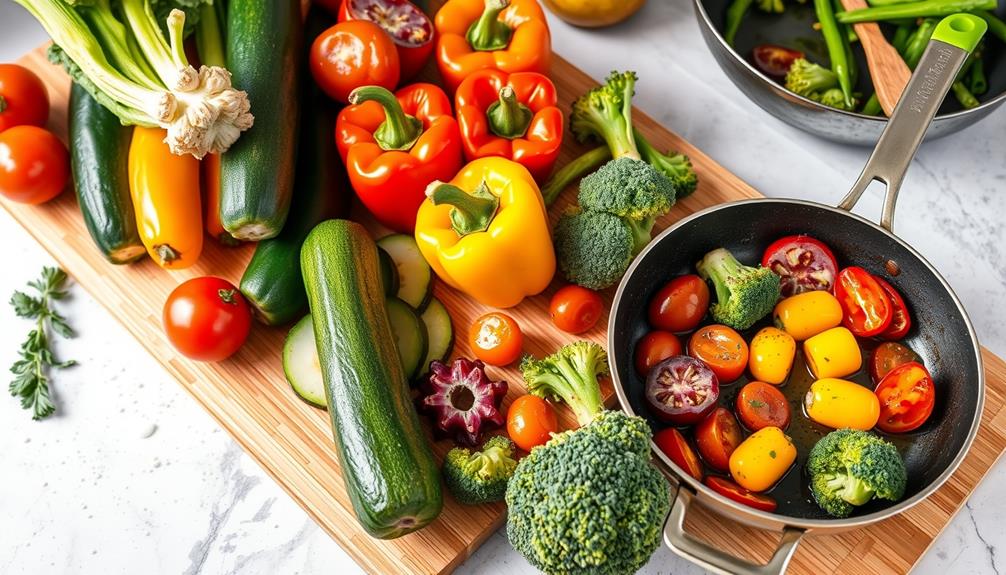
Cooking vegetables in the right way can elevate your keto meals, enhancing both flavor and nutrition. One of the best cooking methods is steaming vegetables, like broccoli and asparagus, as it preserves most of their nutrients. This makes it an ideal choice for keto-friendly options.
Additionally, understanding how different cooking methods affect the nutrient density of vegetables can help you make informed choices, allowing for various brewing methods that enhance the overall experience. Roasting vegetables, such as cauliflower and Brussels sprouts, brings out their natural sweetness without adding extra carbs, making your meals more enjoyable.
Sautéing vegetables in healthy fats, like olive oil or coconut oil, not only maintains nutrient density but also enhances flavor. This technique can transform your dishes into satisfying low-carb delights.
Grilling vegetables, such as zucchini and bell peppers, adds a delicious smoky flavor while keeping the carb content low, perfect for summer barbecues.
Don't forget about raw vegetables! Incorporating them into salads or enjoying them as snacks provides maximum nutrient retention and hydration, perfectly complementing your low-carb lifestyle.
Frequently Asked Questions
What Vegetables Can I Eat on a Keto Diet?
You can enjoy non-starchy vegetables like spinach, kale, broccoli, and zucchini. These options are low in carbs and packed with nutrients. Incorporating them into your meals keeps your diet fresh and supports your health goals.
What Are the Top 10 Keto Foods?
Imagine a treasure hunt; the top 10 keto foods are your gems. You'll find rich avocados, hearty meats, and creamy cheeses. Each choice fuels your journey, keeping you energized while shedding those pesky carbs.
What Veggies Are Not Keto-Friendly?
When considering veggies that aren't keto-friendly, avoid starchy options like corn, potatoes, and peas. They contain high carbs that can disrupt your ketosis. Carrots are nutritious but should be eaten in moderation.
What Can I Eat Unlimited on Keto?
Imagine enjoying a plate piled high with colorful veggies without worrying. You can eat unlimited low-carb options like leafy greens, zucchini, and cucumbers. Just focus on raw or lightly cooked for the best results!
Conclusion
In the garden of your keto journey, choosing the right vegetables is like picking the ripest fruits from the vine. Embrace leafy greens, cruciferous delights, and vibrant peppers as your trusted companions, while steering clear of starchy temptations. By nurturing your plate with these low-carb gems, you'll cultivate health and energy. So, plant these choices in your diet's soil, water them with creativity, and watch your wellness blossom as you thrive on your keto adventure!
